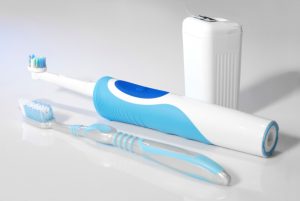 So many toothbrushes are out there on the market today. Electric, manual–what kind is best for you? Waco, TX dentists, Dr. Nick Cobb, Dr. Ron Evans and Dr. Julie Foster of Heart of Texas Smiles, ask you to consider the plusses and minuses of both types.
So many toothbrushes are out there on the market today. Electric, manual–what kind is best for you? Waco, TX dentists, Dr. Nick Cobb, Dr. Ron Evans and Dr. Julie Foster of Heart of Texas Smiles, ask you to consider the plusses and minuses of both types.
The manual toothbrush
Advisers to the American Dental Association say that the basic manual toothbrush really helps remove sticky plaque from tooth enamel, gums and other soft tissues of the mouth. When brushing for 2 minutes, 2 times a day according to the ADA’s standard recommendation, the average user will do just fine in keeping his mouth clean and less prone to decay and gum disease. This is particularly so when combined with daily flossing in between teeth and at the gum line. Also, manual toothbrushes cost less, helpful to the individual or family on a tight budget.
On the other hand, if a dental patient shows signs of sloppy brushing habits, the manual brush may not do the job. Additionally, people with arthritic hands and other disabilities which affect dexterity often find the skinny handles of many manual toothbrushes difficult to hold and manipulate. Unless the patient or a caregiver modifies the handle, the wider gripped electric toothbrush does a better job.
The electric toothbrush
In the United States, electric toothbrush began its successful run through bathrooms across the country in 1960. Either battery-powered or plugged into a bathroom outlet, this spinning-headed gadget delivers literally tens of thousands of brushing stroke per minute.
Dental hygienists routinely tell patients new to electric brushes to “Let the brush do the work for you.” In fact, using an electric toothbrush is much like mowing grass or trimming a hedge with electric- or gas-powered lawn equipment. Just start and go, steering accurately around the mouth, including teeth, gums, tongue and roof of the mouth.
In particular, children find electric brushes fun to use, and many styles and sizes appeal to the needs of young dental patients. Additionally, the big handle conquers manual dexterity issues, and many dentists and hygienists believe electric models achieve a better clean–a boon for sloppy brushers and flossers.
Two drawbacks to the electric toothbrush are the initial cost and vibrating bristles. Some individuals find the motion and feel of the bristles tickly or even disturbing.
What kind of brush is for you?
Ask your Waco, TX dentist or dental hygienist at Heart of Texas Smiles for a recommendation. They know your oral health needs and habits best and care steer you toward an oral hygiene routine to maintain a sparkling smile for a lifetime.
To schedule your next semi-annual oral exam and cleaning, contact Heart of Texas Smiles and speak to the friendly staff.
